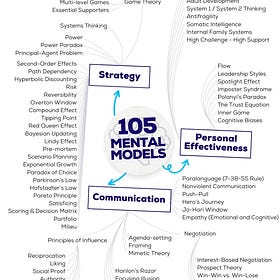30 Cognitive Biases You Fall for in Politics
Don't be a squirrel. Copy the 30 biases and look at them before your next important decision
You've heard that storytelling is powerful.
It's so powerful that it can be misleading. Our brains love stories, because they paint a picture in our minds and they simplify complex information. We believe a story that "makes sense", even if inaccurate or misleading.
It's a cognitive bias called the 'Narrative Fallacy'.
Luckily, you can guard against cognitive biases. It starts with being aware of them.
Unfortunately, our brains have a long list of cognitive biases. Evolution wanted it that way: cognitive biases are shortcuts that help you be efficient and survive. But they get in the way of deliberate decision-making.
And therein lies one answer to the core question of politicwise:
How do we make politics wiser?
Avoid cognitive bias as best as you can.
The Narrative Fallacy is only one of many cognitive biases.
🐿️ I've been collecting cognitive biases like a squirrel collects nuts. I put them in different places and forget about them. 🌰
So, I've now pulled them all together into a list. It can work like a checklist for important decisions. They come in 4 buckets:
Information processing biases
Social perception biases
Self-related biases
Decision-making biases
Copy this if you like 👇
Information Processing Biases
These biases affect how you search for, interpret, and remember information.
Confirmation Bias: tendency to favor information that confirms pre-existing beliefs or hypotheses.
Anchoring Bias: relying too heavily on the first piece of information received when making decisions.
Availability Heuristic: overestimating the importance of information that comes to mind easily.
Negativity Bias: tendency to pay more attention to negative information than positive.
Selective Perception: tendency for expectations to affect perception.
Framing Effect: influencing decision-making and judgment by how information is presented.
Hindsight Bias: inclination to see events that have already occurred as being more predictable than they actually were.
Attentional Bias: tendency to focus on certain elements while ignoring others based on their salience or emotional impact.
Narrative Fallacy: creating a story or pattern to events to make sense of a series of facts that may not be related.
Social Perception Biases
These biases influence how you perceive and interact with other people, especially in group settings.
Ingroup Bias: favoring one’s own group or those perceived to be part of the same group.
Outgroup Homogeneity Bias: perceiving members of an outgroup as more similar to each other than they actually are.
Fundamental Attribution Error: tendency to attribute others' actions to their character rather than to situational factors.
Halo Effect: bias where impressions in one area influence opinion in another area.
Authority Bias: tendency to attribute greater accuracy to the opinion of an authority figure and be more influenced by that opinion.
Projection Bias: assuming others share the same beliefs or will behave similarly in a certain way.
Groupthink: practice of making decisions as a group in a way that discourages individual responsibility or creativity.
Self-Related Biases
Biases that relate to your self-perception, influencing how you look at success and failure.
Dunning-Kruger Effect: phenomenon where people with little knowledge overestimate their ability.
Self-serving Bias: attributing positive events to one’s own character but attributing negative events to external factors.
Overconfidence Bias: tendency to hold a too-favorable view of one’s abilities or opinions.
Optimism Bias: bias that causes someone to believe that they themselves are less likely to experience a negative event.
Pessimism Bias: expecting the worst, often leading to stress and depression.
Escalation of Commitment: Doubling down on a failing course of action to justify investments already made.
Decision-Making Biases
These biases impact how decisions are made, often irrationally deviating from optimal decision-making.
Status Quo Bias: preference to keep things the same by sticking with a decision previously made.
Bandwagon Effect: tendency to do or believe things because many other people do or believe the same.
Backfire Effect: when people react to disconfirming evidence by strengthening their beliefs.
False Consensus Effect: overestimating how much others agree with us.
Mere Exposure Effect: developing a preference for things merely because they are familiar.
Not Invented Here Bias: tendency to avoid using or buying products, research, standards, or knowledge from outside a group.
Ambiguity Effect: avoidance of options for which the probability of a favorable outcome is unknown.
Zero-risk Bias: preferring to completely eliminate a risk even when alternative options produce a greater reduction in risk overall.
Happy bias-busting!
Check out my full-length article on mental models in politics 👇
105+ Ways to Make Better Decisions in Politics With Mental Models
Here's an overview of the article: What & Why of Mental Models Three Benefits of Using Mental Models: Make Wiser Decisions Learn Like A Pro Succeed With AI How To Use The List of Mental Models 105 Mental Models 30 Mental Models for Strategy 30 Mental Models for Communication




